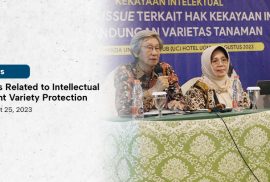
On Friday, August 25, 2023, the Directorate of Research of Universitas Gadjah Mada (UGM) held a Focus Group Discussion on the Preparation of Intellectual Property (IP) Curriculum Supporting Modules, with the theme, “Current and Future Issue Terkait Hak Kekayaan Intelektual Pelindungan Varietas Tanaman” (Current and Future Issues Related to Intellectual Property Rights in Plant Variety Protection). This activity was one of a series of activities in the preparation of supporting IP modules, in a collaborative effort between Universitas Gadjah Mada and the Directorate General of Intellectual Property (DJKI) of the Ministry of Law and Human Rights of the Republic of Indonesia. The purpose of this activity was specifically to enrich knowledge and provide insight and understanding related to plant variety protection (PVP), and support the enrichment of PVP module material.
The FGD began with remarks from the Director of Research of UGM, Prof. Dr. Mirwan Ushada, S.T.P., M.App.Life.Sc. In his speech, Prof. Mirwan expressed his gratitude to the Directorate General of Intellectual Property for its collaboration with UGM in the preparation of the IP modules. This year, UGM has conducted two major collaborations that not only support downstream commercialization but also the upstream. Said Prof. Mirwan: “Research results support the development of knowledge sharing, increase competitive human resources, and support the vision of Golden Indonesia 2045.” Before ending his remarks, Prof. Mirwan expressed his hope that the various parties in attendance share their experiences, ideas, and input, so as to support the Current and Future Issues Related to Intellectual Property Rights in Plant Variety Protection, as the basis for making IP curriculum modules in the PVP field.
The speech was followed by Erni Purnamasari, S.H., M.H., as the Coordinator of Intellectual Property Empowerment. Erni said that in DJKI there is an activity agenda in the form of IP Academy, where an MOU has been signed between DJKI and the World Intellectual Property Organization (WIPO). This FGD activity is expected to provide input on modules supporting the IP curriculum, especially in the field of PVP as support for the IP Academy, which should ultimately provide national benefits.
The FGD continued with a discussion on Current and Future Issues Related to Intellectual Property Rights in Plant Variety Protection, delivered by the Head of the Center for Plant Variety Protection and Agricultural Licensing (PVTPP), Dr. Ir. Leli Nuryati, M.Sc., and Ir. Ayub Darmanto, the Managing Director of PT. Primasid Andalan Utama. The discussion session was moderated by Dr. Panjisakti Basunanda, S.P., M.P., lecturer from the Faculty of Agriculture, UGM. On this occasion, Leli conveyed several strategic issues related to PVP, including the need for regulatory alignment, namely the suitability of the latest regulations with the needs and developments of the times. It is important to implement adequate legal protection for business actors in the seed industry, in addition to more concrete steps to ensure conducive legal handling. Harmonization of the PVP System at the international level is also needed, by developing a consistent and standardized system across jurisdictions. This can support the facilitation of cross-border trade, protecting IP more effectively and strengthening international cooperation in the field of IP. Indonesia plans to become a member of the International Union for the Protection of New Varieties of Plants (UPOV), so there needs to be synergy and collaboration with all stakeholders, as well as harmonizing Indonesian Law No. 29 of 2000 and the 1991 UPOV Convention. “Harmonization of PVP has many benefits, but its implementation at the international level can be very complex due to differences in socio-economics, culture, legal systems, and national interests,” said Leli. At the end of the discussion, Leli further explained that the PVTPP will encourage Indonesia to prepare to become a member of UPOV. Leli also hoped for cooperation from various parties, especially from the Ministry of Law and Human Rights.
In the second session, the discussion was led by Ir. Ayub Darmanto on several matters related to problems that occur in the field. Some of the problems that are often encountered are the propagation of varieties that have received PVP rights by irresponsible parties, or as was said by Ayub, “The use of varieties that have received PVP rights to create new types of superior varieties.” The unauthorized use of male/female parents to produce hybrid derivatives is a problem that is not uncommon in the seed industry. As a business entity that employs breeders, the seed industry can also have protection rights over new and superior varieties that have been produced. Along with the development of new varieties that already have PVP rights, various concerned parties will also get economic rights in the form of royalties on these new varieties. With the existence of PVP protection, new superior varieties will be easier to socialize in all agricultural sectors, so as to attract many parties to invest. On this occasion, Ayub proposed that the implementation of the New, Unique, Uniform, and Stable (BUSS) test could be carried out simultaneously with the variety release test to save costs. In addition, DNA marking is needed to anticipate if there is a claim against varieties that have received a PVP certificate. “It would be nice if the PVTPP could bridge parties if there is a dispute over varieties that have received a PVP certificate,” said Ayub. Finally Ayub conveyed that for beginner breeders, support should be given in the form of exemption from annual fees for 3 years, starting from the issuance of the PVP certificate.
Penulis : Baskara Wismarizqa
Foto : Regita Cahya Santi

